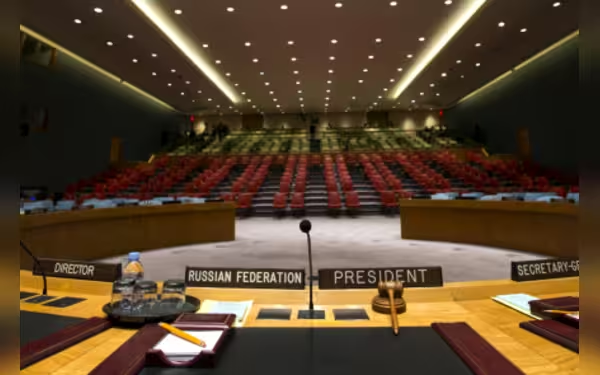Saturday, November 16, 2024 09:50 PM
UN Security Council Meeting on Afghanistan Scheduled for September 18
- UN Security Council to discuss Afghanistan's ongoing challenges.
- Key speakers include UNAMA head Roza Otunbayeva.
- Civil society activist to voice Afghan concerns.
 Image Credits: thefrontierpost
Image Credits: thefrontierpostThe UN Security Council will meet on September 18 to address Afghanistan's challenges, featuring key speakers and civil society insights.
The United Nations Security Council is set to convene a significant meeting on Afghanistan this Wednesday, September 18. This quarterly gathering aims to address the ongoing challenges faced by the country, which has been under intense scrutiny since the Taliban's return to power in August 2021. The meeting will feature key speakers, including Roza Otunbayeva, the head of the United Nations Assistance Mission in Afghanistan (UNAMA), and Sima Bahous, the Executive Director of UN Women. Their insights are expected to shed light on the current situation in Afghanistan, which remains precarious.
During the meeting, Otunbayeva will present a comprehensive quarterly report detailing the political, economic, and social conditions in Afghanistan. This report is crucial as it provides the Security Council with the necessary information to understand the evolving landscape of the country. Following the open briefing, closed consultations will take place, allowing for a more in-depth discussion among Security Council members.
In addition to the UN officials, a civil society activist will also have the opportunity to voice concerns regarding the situation in Afghanistan. Yousuf Amin Zazai, a political analyst, emphasized the importance of this meeting, stating, "This meeting is valuable for the future of our country with the world. I emphasize that the voice of the Afghan people should be prioritized and should be the basis of these discussions." This highlights the need for the international community to listen to the Afghan populace as they navigate their current challenges.
While the Islamic Emirate has not publicly commented on the upcoming meeting, it has consistently urged the UN to accurately reflect the realities on the ground in its reports. The significance of these quarterly meetings cannot be understated. Saleem Paigir, another political analyst, pointed out, "To enable the Security Council to review Afghanistan’s political, economic, and social situation and report to the world, these meetings are held every three months. Unfortunately, so far, they have not brought anything good to the people of Afghanistan." This sentiment underscores the frustration felt by many regarding the effectiveness of international interventions.
In its latest report, UNAMA criticized the human rights situation in Afghanistan, a claim that the Islamic Emirate has dismissed as baseless. This ongoing tension between the UN and the Taliban government raises questions about the future of human rights and governance in Afghanistan.
As the world watches, the upcoming UN Security Council meeting on Afghanistan will be pivotal. It serves as a platform for dialogue and a chance for the international community to reassess its approach to the country. The outcomes of this meeting could have lasting implications for the Afghan people, who continue to face numerous challenges. It is essential that their voices are heard and that any discussions prioritize their needs and aspirations for a better future.













